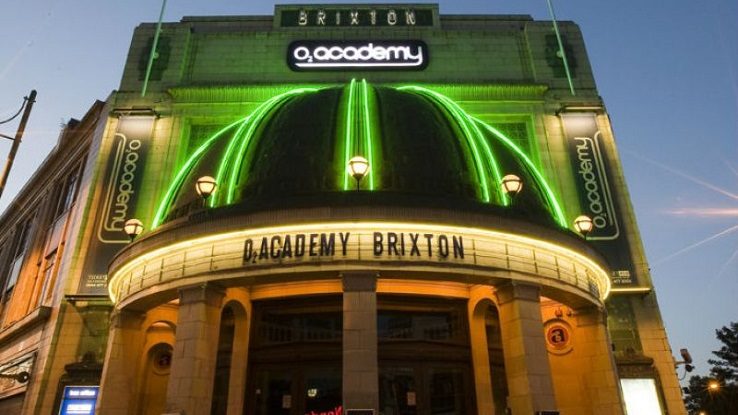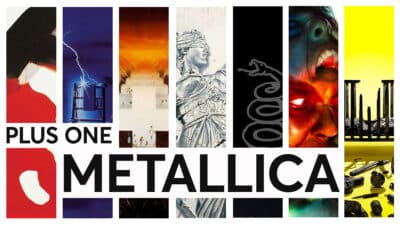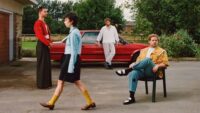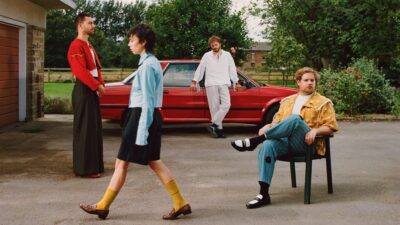Music

Feature
Things you may not know about these 13 UK venues
We dug into the archives to give you the low-down on some of the UK’s most iconic music venues.
Music venues across Britain have provided the backdrop for legendary shows and epic nights out for hundreds of years. They have witnessed entertainment icons grow from open mic newcomers to stadium headliners, and they are very dear to the hearts of many in this country. Now, it’s time to find out a little more about the places in which fans have created countless lifelong memories.
Here are some of the most interesting, sometimes little-known, facts about some of our favourite venues, from Glasgow’s King Tut’s Wah Wah Hut to Manchester Arena and Cardiff’s Clwb Ifor Bach, and many more.
100 Club (London)
The oldest independent music venue in the world, London’s 100 Club has been putting on live music since 1942, then as the Feldman Jazz Club. It has now been known as the 100 Club since 1964. But did you know the stage you see today is still the very same stage built in that year, by then-owner Roger Horton? That stage has welcomed the likes of the Rolling Stones, The Clash and Amy Winehouse, to name just a few. If only stages could talk…
Barrowland Ballroom (Glasgow)
Having welcomed musical giants such as Foo Fighters, Biffy Clyro, Bowie, and U2 through its doors, Glasgow’s Barrowland Ballroom was largely destroyed in a huge fire back in 1958 and reopened just two years later. Today, as you enter the building you can see a cartwheel above the stairs. It’s taken from the original neon-sign and is the only remaining artefact that could be rescued from the blaze.
And here’s an additional fun fact: The new neon sign was completed in 1985, and rumour has it that it costs £1.10 per hour (plus VAT) to run – but it’s a gorgeous piece of artwork!
Cavern Club (Liverpool)
Liverpool’s Cavern Club has played a huge role in the rise of British pop music. Named after the Paris jazz club Le Caveau De La Huchette, it opened on 16 January 1957. Over the following years it would play host to artists like LGBT icon Sister Rosette Tharpe, Ronnie Scott, The Beatles, Status Quo, and Oasis. Paul McCartney and Ringo star are also said to have made their debuts at the Cavern Club. With a legendary history, it does come as a little surprise that the club did not have a licensed bar for its first ten years of being open.
Clwb Ifor Bach – Cardiff
Long before Cardiff’s iconic Clwb Ifor Bach became the hub for the likes of Kasabian, Biffy Clyro, George Ezra, and The Strokes, the venue was once a social club for Welsh speakers. It was only towards the mid-nineties that it became increasingly established as a music venue, with two rooms to host a multitude of events throughout the touring calendar.
The Joiners (Southampton)
In 2013, Southampton’s The Joiners was named Britain’s best small music venue in a competition run by the NME. And having hosted gigs by Ed Sheeran, Arctic Monkeys, The 1975, Radiohead, and Green Day, it comes as no surprise. Just recently Frank Turner even helped save the legendary venue from having to close its doors permanently. But did you know that the venue had been pouring pints as a pub for over 100 years before their opening in 1968?
https://www.instagram.com/p/BsqgK6QAn67/
King Tut’s Wah Wah Hut (Glasgow)
One of the UK’s hotspots for musical talent, Glasgow boasts many iconic venues, but none are as celebrated for nurturing emerging artists as King Tut’s. In its 30 year history, the venue has seen bands like My Chemical Romance, Pulp, Florence & The Machine and of course Scottish rock trio Biffy Clyro rise through the ranks. In 2018 US super rockers The Killers even played an intimate after-show party at King Tut’s after headlining TRNSMT Festival.
Legend has it that in 1993, King Tut’s Wah Wah Hut was the place where Britain’s most famous brothers were discovered and signed by Alan McGee. Oasis had played the venue on 31 May 1993, with just four tracks including a Beatles cover. The rest is Britpop history.
Leadmill (Sheffield)
What is now a staple of the Sheffield music scene was once an abandoned corn mill, adopted by punks and hippies in 1980 in response to very few cultural facilities in the city. Transformed into the arts space now known as the Leadmill, it has hosted the likes of Muse, Coldplay, The WhiteStripes, James, and Artic Monkeys.
Just last month the venue auctioned off memorabilia to help them stay open. That auction included a guitar, signed by the Arctic Monkeys and made from the venue’s wood floor.
Manchester Arena (Manchester)
Located right in the heart of Manchester, one of the UK’s biggest indoor arenas has welcomed shows by artists such as U2, Rolling Stones, and Madonna. Comedy star Peter Kay has even played the arena a whopping 56 times. But it also plays host to big sporting events. In 2008 Manchester Arena hosted the World Swimming Championships, which required 2 million litres of water. That’s the equivalent of taking 25,000 baths! If you were to take a bath a day you’d still need 68 years to use up all that water.
O2 Academy Brixton (London)
Many stories hide within the walls of Brixton’s legendary O2 Academy. From record-breaking residencies (both The Mighty Boosh and The xx played a whopping seven nights) to hosting truly iconic shows, the venue has been the cornerstone of live music in south London.
Built in 1929 as part of the Astoria Group, the building has seen some of the most legendary shows over the last century. It was the first venue to ever be granted a 6AM licence in the UK (cue legal all-night raves) and has had over 50 live albums recorded. But did you know the Academy also has the largest fixed stage in Europe?
O2 Victoria Warehouse (Manchester)
Manchester’s O2 Victoria Warehouse, with its cast-iron columns and supporting wooden beams, was exactly that – a warehouse. It was at the centre of the global cotton trade for Manchester as part of the Liverpool Warehousing Company. Built in 1925 and 1936, its two warehouses were refurbished in 2009 to become a hospitality and events venue with multiple rooms.
Rock City (Nottingham)
Rock City Nottingham is the ONLY venue in Nottingham to ever host David Bowie. The performance happened back in 1997 and was a surprise announcement as part of an eight-date tour, with tickets just costing £15.
Oh, and the first ever band scheduled to headline the venue was none other than metal gods Iron Maiden. The show had to be cancelled though when the venue wasn’t ready in time.
SSE Hydro (Glasgow)
One of the newer venues – opened in 2013 – The SSE Hydro in Glasgow has already played host to artists like Beyonce, Dolly Parton, Take That, and Elton John. But here’s two fun facts you may not have known about the venue before.
The environmentally friendly grassy Saturn-like ring around the outside of The Hydro is planted in a way which promotes the health and wellbeing of bees and butterflies in the area. The Hydro is also built on Roman amphitheatre principles – with no pillars and clear sightlines throughout. So no matter where you are sat, you’ve got full view of the stage.
Wembley Stadium (London)
Wembley Stadium is huge. It has a circumference of 1km (0.62 miles) and boasts an inside capacity of 4,000,000 cubic metres. That means you could cram about 25,000 double decker busses into the stadium… and there’s only roughly 8,600 public transport busses in all of London.
https://www.youtube.com/watch?v=jcwBsntqjmY
Music Venue Trust have recently launched a campaign to help save your local venues. The campaign aims to help grassroots music venues keep afloat in these times, find out how you can help support #saveourvenues here. To support individual venues, we have listed their crowdfunding campaigns here.









